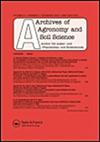Short-term changes of soil physicochemical properties affected by organic modifier type and its application method
IF 1.8
4区 农林科学
Q1 AGRONOMY
引用次数: 0
Abstract
ABSTRACT Managing soil modifier application is important to improve the soil properties. The purpose of the experiment was to study the short-term (0, 60, 120, 180 days) changes of the soil properties affected by the organic modifier types (barberry biochar, poultry manure, vermicompost, wheat straw), and their application methods (mixing and mulching). This study was carried out in a laboratory scale where organic modifiers were used at 5% ratio (by weight) with four replicates. The factorial experiment was performed based on a totally random design using variance analysis, mean comparison and the least significant difference (LSD) test (p < 0.05). The soil characteristics were enhanced by all organic modifiers. The highest amounts of nitrogen, phosphorus, and potassium were obtained from the poultry manure. The highest amounts of calcium and magnesium were related to the barberry biochar at 120 and 180 days, and led to increasing up to 1.33, and 2.5 times, respectively, compared to the control. Promising results were observed in soil physicochemical properties when barberry biochar was applied as mixed with the soil for 180 days. The mixed application of the poultry manure and barberry biochar for 180 days was the best treatment.有机改性剂类型对土壤理化性质的短期影响及其应用方法
摘要管理土壤改良剂的施用对改善土壤性质非常重要。实验的目的是研究短期(0,60,120,180 d)有机改性剂类型(barberry生物炭、家禽粪便、蚯蚓堆肥、小麦秸秆)及其施用方法(混合和覆盖)对土壤性质的影响。这项研究是在实验室规模下进行的,其中有机改性剂以5%的比例(按重量计)使用,四次重复。析因实验基于完全随机设计,使用方差分析、平均值比较和最小显著性差异(LSD)检验(p < 0.05)。所有有机改性剂均能提高土壤特性。从家禽粪便中获得的氮、磷和钾含量最高。钙和镁的最高含量与120和180的barberry生物炭有关 天,与对照组相比,分别增加了1.33倍和2.5倍。将barberry生物炭与土壤混合施用180天后,在土壤理化性质方面观察到了有希望的结果 天。鸡粪与生物炭混合施用180 天是最好的治疗方法。
本文章由计算机程序翻译,如有差异,请以英文原文为准。
求助全文
约1分钟内获得全文
求助全文
来源期刊

Archives of Agronomy and Soil Science
AGRONOMY-SOIL SCIENCE
CiteScore
5.50
自引率
4.20%
发文量
107
期刊介绍:
rchives of Agronomy and Soil Science is a well-established journal that has been in publication for over fifty years. The Journal publishes papers over the entire range of agronomy and soil science. Manuscripts involved in developing and testing hypotheses to understand casual relationships in the following areas:
plant nutrition
fertilizers
manure
soil tillage
soil biotechnology and ecophysiology
amelioration
irrigation and drainage
plant production on arable and grass land
agroclimatology
landscape formation and environmental management in rural regions
management of natural and created wetland ecosystems
bio-geochemical processes
soil-plant-microbe interactions and rhizosphere processes
soil morphology, classification, monitoring, heterogeneity and scales
reuse of waste waters and biosolids of agri-industrial origin in soil are especially encouraged.
As well as original contributions, the Journal also publishes current reviews.
 求助内容:
求助内容: 应助结果提醒方式:
应助结果提醒方式:


